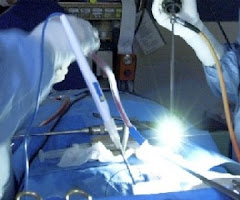Failed Back Surgery Syndrome (FBSS) affects close to 80,000 patients a year, as reported on the National Institute of Health’s website. Patients suffering from this syndrome continue to have chronic, disabling pack pain after one or more spinal surgeries. Typically, each subsequent surgery to correct the problem has a lower likelihood of success. It is important to understand that – with just a few simple steps - how this debilitating syndrome can easily be prevented.
There are many reasons that a surgery may or not work. Spine surgery is basically able to accomplish only two things:
1) Decompressing a nerve root that is pinched, or
2) Stabilizing a painful joint
It would be nice if back surgery or spine surgery could totally eliminate a patient’s pain. It is only able to change anatomy. An anatomical lesion (injury) that is a probable cause of back pain must be correctly diagnosed prior to any type of corrective surgery. The number one reason for Failed Back Surgery Syndrome is because the injury that was operated on what not the underlying cause of the patient’s pain.
There are two ways to avoid a spine surgery that leads to an unsuccessful outcome. First and foremost, it is important to choose your spine team wisely. Back pain can be a complex issue that may possible require a team of health professionals to diagnose and treat. Secondly, stick to operations that have a high degree of success and make sure that an anatomic injury that can be surgically corrected is identified preoperatively.
Until recently, repeated surgeries rarely relieved FBSS pain. But medical developments have made great strides, allowing FBSS patients to once again live their lives pain-free. These advances over traditional open and fusion spines surgeries allow for greater precision, faster healing and less damage to healthy tissue. Advanced spine surgeries today can employ the smallest incision possible to correct problems attributed to FBSS with patented instrumentation and methods.
To learn more, visit www.bonati.com or call (866) 298-7513.
Tuesday, July 8, 2008
Subscribe to:
Post Comments (Atom)


1 comment:
I had neck/back injury, nearly 30 years prior, which resulted in 3 different neck surgeries. The last one ended with fusion of all cerevical discs. That was nearly 12 years ago. I am again having symptoms of spinal problems! Truthfully, they never actually totally gone away. I never allowed my degenerative "back" to be done, while I was dx with stenosis of the cerevical. Right now, I am having a lot of problem with painful shoulders, numbness in all extremities @ times, and I have fallen on three different occasion without warning. My handwriting is horrible. I hate meds, but I will take an occasional otc med for severe pain. I live in Texas. Do you have any seminars scheduled here in the near future?
Post a Comment